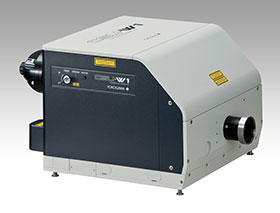

While the world was abuzz with excitement over the revival of U.S. manned spaceflight, another equally promising space endeavour flew under the radar. On 20 May, the H-II Transfer Vehicle (HTV-9), affectionately called “Kōnotori” or “white stork” in Japanese, was launched from the Tanegashima Space Center in southern Japan. Its destination: Japanese experiment module “Kibō," the largest laboratory unit on the International Space Station (ISS).
The HTV-9 contained 6,2 metric tons of essential supplies and specialized experimental instruments, including a Yokogawa CSU-W1 confocal scanner unit (CSU). As a core component of Chiyoda Corporation’s COSMIC confocal microscope system, Yokogawa’s CSU will analyze the gravity response of living cells and their 3D structures. The ISS’s microgravity environment, cosmic radiation exposure, and isolated location in outer space combine to make it the optimal setting for this type of experiment.
Given that the ISS is the ideal platform for this research, Yokogawa’s CSU-W1 is the ideal tool. Chosen by Chiyoda Corp. for its wide field of view and high-resolution images, the CSU-W1 utilizes Yokogawa’s proprietary, high-speed dual spinning-disk technology to enhance performance and optimize scanning speed. The design consists of two coaxially aligned disks, each of which contains over 20 000 pinholes arranged in a series of nested Archimedean spirals. Fresnel micro lenses in the upper disk focus light onto the pinholes of the lower disk and direct it into the specimen, then a dichromatic mirror refines and reflects the resulting signal to the microscope’s camera.
Using this system of advanced beam shaping, the micro lenses gather laser light to increase the CSU’s throughput, allowing it to approach 40 to 60 percent – approximately 10 times greater than a traditional single spinning-disk confocal. A higher light throughput allows imaging of cells with very low levels of fluorescence. Compared to laser scanning and wide field fluorescence methods, the laser power necessary for scanning a sample is much lower. The significant reduction in fluorophore photo bleaching rates that results enables long-term observation of live cell cultures.
26 May marked the beginning of a new chapter in the field of life science. That day, the Japan Aerospace Exploration Agency (JAXA) announced HTV-9’s arrival at its destination and confirmed that COSMIC will be used in experiments beginning this fall. Advancing our knowledge of cells beyond the physical confines of our planet is essential to the determination of the effects of long-term space travel on the human body. It could even hold the key to discovering the origin of life on earth. Scientists aboard the ISS will use COSMIC and the CSU-W1 to support research that explores 3D bio fabrication of human organs in space. This could also provide valuable insight into the biological feasibility of colonizing other planets.
Here on earth, Yokogawa’s spinning-disk technology is used for research in drug discovery, biotechnology, neuroscience, and molecular biology, among other fields. With over 3 000 devices sold to date, the top-of-the-line CSU models have established Yokogawa’s presence in the global life sciences industry. By enabling researchers to observe the movement of proteins and physiological responses within living cells in real-time, the company’s CSUs have become indispensable tools in labs all over the world – and now, even beyond!
| Tel: | +27 11 831 6300 |
| Email: | [email protected] |
| www: | www.yokogawa.com/za |
| Articles: | More information and articles about Yokogawa South Africa |
© Technews Publishing (Pty) Ltd | All Rights Reserved